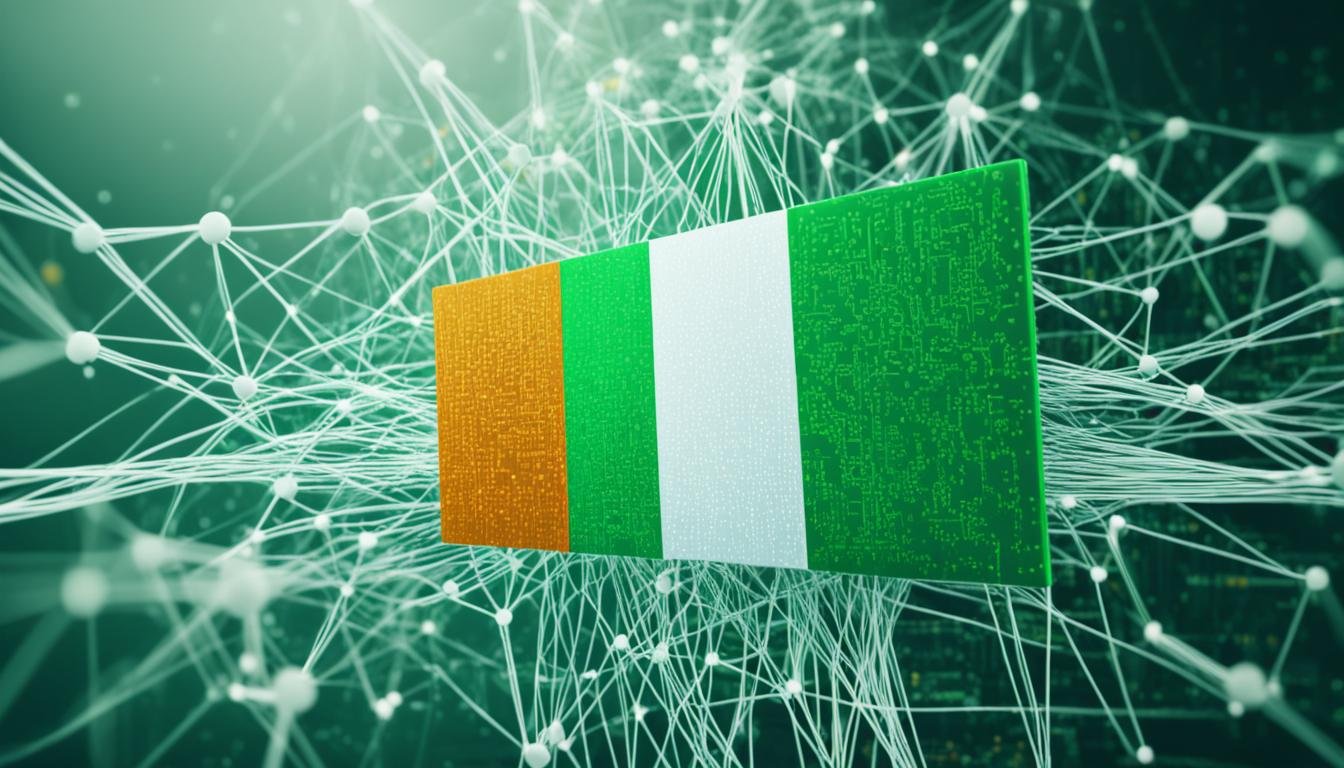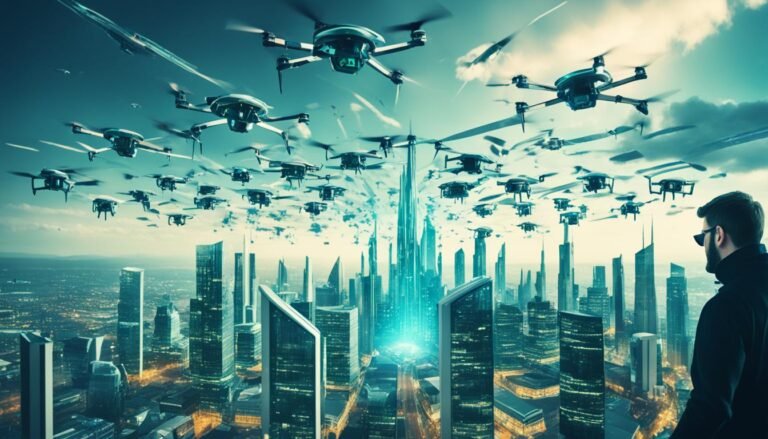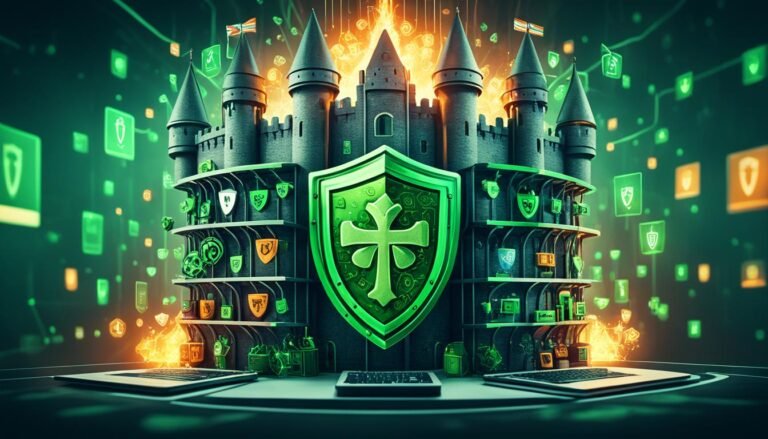The Role of AI in Modern Cybersecurity: An Irish Perspective
Did you know that 88% of ISC2 members see AI affecting their cybersecurity roles? This shows how AI is changing the game, helping fight new threats. In the past six months, 54% noted more cyber threats. Of these, 13% were because of AI’s influence. These stats stress the need for AI in security efforts today.
This piece explores AI’s many roles in cybersecurity from an Irish viewpoint. Ireland is making strides with AI in cybersecurity thanks to both the government and private sector. This change isn’t just about defense. It also means using AI to predict threats, analyze behavior, and make decisions. For instance, CrowdStrike’s Falcon platform showcases this approach well.
Key Takeaways
- 88% of ISC2 members report AI’s impact on their cybersecurity roles.
- 54% observed increased cyber threats, with 13% due to AI-generated threats.
- 35% of cybersecurity professionals say AI affects their daily functions.
- 82% believe AI will improve job efficiency for cybersecurity experts.
- AI’s role in monitoring network traffic and automating tasks is vital.
Overview of AI’s Impact on Cybersecurity
Artificial Intelligence (AI) has changed cybersecurity a lot. It’s now better at fighting off cyber threats. In the last four years, AI’s use in cybersecurity has more than doubled, showing how important it’s becoming.
Evolution of AI in Cyber Defense
AI started with predictive tasks, using old data to foresee threats. Now, it also uses machine learning in things like spotting unusual user behavior and creating fake attack scenarios. This change helps find threats faster and makes responding to them quicker, all with real-time advice from AI.
AI helps in cybersecurity with three main ways:
- Pattern Insights: It spots strange patterns in data that might be signs of cyberattacks.
- Actionable Recommendations: It gives clear advice on how to deal with any threats.
- Autonomous Mitigation: It can automatically fight back against cyber threats without needing human intervention.
This AI-driven approach lets experts act faster against cyber dangers. It lowers the chances of data breaches and keeps unauthorized people out.
Machine Learning and Cybersecurity
Machine learning is key in modern cybersecurity. It checks big sets of data to make behavior and prediction analysis more accurate. This tech supports fast decisions and spots security flaws better, improving overall safety.
AI is crucial in identifying and countering cyber threats. The need for AI experts is growing, showing that companies want more advanced security. These experts make cybersecurity better by reducing human mistakes.
AIs in manual jobs and semi-manual tasks cut down on mistakes. They make cybersecurity more reliable. This is especially vital in defending critical areas, like national security, from large risks.
Understanding AI-Enhanced Threat Detection
AI-enhanced threats are getting more advanced, so we need better tech to spot them. With AI, companies can find potential threats that humans might miss. This is a big jump in making our online world safer.
AI helps detect threats early, reducing damage from cyberattacks. It uses data analysis to predict new threats. This means defenders can focus on stopping threats before they happen, making security much better.
Good data is key for AI to work well. It needs accurate and up-to-date information. As AI learns more, it keeps getting better at finding threats, making defenses stronger.
Another use of AI is in tricking attackers with fake systems. This lowers the risk of attacks working. It shows how AI makes our security tools more creative and effective.
AI and people working together is crucial. AI speeds up how fast we can make decisions. This means experts can spend more time on the big challenges, using their skills better.
| Benefits of AI-Enhanced Threat Detection | Details |
|---|---|
| Early Detection | Enables rapid response and minimizes impact. |
| Predictive Analytics | Anticipates emerging threats and prioritizes defenses. |
| Automated Analysis | Facilitates swift threat mitigation. |
| Proactive Prevention | Shifts focus from reactive to proactive security measures. |
| Quality Data Input | Ensures accurate and reliable threat detection. |
| Self-Learning Systems | Continuously improve threat detection over time. |
| Deception Technology | Uses decoy systems to confuse attackers. |
| Human-AI Collaboration | Facilitates strategic decision-making by cybersecurity professionals. |
Machine Learning in Cybersecurity
Machine learning is a key part of keeping our digital world safe. It’s very good at spotting and dealing with online dangers. It uses smart pattern analysis to find signs of cyber threats that are not obvious. This way, it helps make our online defenses stronger.
Pattern Recognition and Anomaly Detection
What’s really cool about machine learning in cybersecurity is how it spots unusual activities. Working with huge amounts of data, it looks for things that don’t fit right. By getting smarter over time, it can also guess where future risks might be hiding. This is good for keeping our online spaces safer.
Automated Threat Response
When something bad is found, machine learning can act fast to stop it. This quick, smart reaction can prevent a lot of harm. The more it learns, the better it gets at stopping threats. This makes it a powerful ally in the fight against cyber dangers.
By adding AI in defense systems, groups can get better at staying safe. They can be ready for new types of attacks, making their defense plans smarter and more effective.
| Workload Type | Hours per Semester (Full-Time) | Hours per Semester (Blended) | Hours per Semester (Part-Time) |
|---|---|---|---|
| Lecture | 24 | 12 | 24 |
| Tutorial | 24 | 12 | 24 |
| Independent Learning | 77 | 77 | 77 |
| Directed Learning | N/A | 24 | N/A |
The Use of AI in Ireland’s Cybersecurity Landscape
Ireland’s cybersecurity initiatives have made big strides recently thanks to AI. Both the government and private companies are teaming up. They aim to make Ireland’s defenses against cyber threats stronger using AI.
Government Initiatives and Funding
The Irish government is taking steps to use AI more for security. It’s investing in AI security programs. This move highlights AI’s role in fighting cyber dangers today.
- Over 70% of Irish executives lack awareness or preparation for compliance with NIS2 legislation, reinforcing the need for government-led educational campaigns.
- With NIS2 set to impact 18 sectors and over 180,000 companies across the EU, compliance becomes a priority, and government funding plays a crucial role.
Private Sector Adoption
The Irish digital security is also getting help from the private sector. Many companies are now using AI to fight complex cyber threats. But, more leaders could still adopt AI for better cyber protection.
| Aspect | Percentage |
|---|---|
| AI Adoption by Executives | 14% |
| Uncertainty about AI | 30% |
| Organizations Conducting Regular Cybersecurity Training | 57% |
| Employ Multi-layered Defense Strategy | 38% |
| Organizations Without IT Security Investments for Next Year | 26% |
Most companies (74%) are keeping their spending on cyber safety the same. They’re showing a long-term dedication. With AI getting better fast, more firms are likely to use it for guarding their online stuff.
AI in Threat Detection and Response
AI is changing how we fight cyber threats. It helps human experts with its advanced intelligence. This makes finding and dealing with threats faster and more efficient.
AI is great at handling lots of malware. There are over 500 new threats every minute. AI is key to staying on top of this. Most experts believe it makes their jobs better, helping them respond to attacks more effectively.
But, using AI comes with concerns. Many worry it could be turned against us in cyberattacks. Others are concerned about the ethics of using AI in security. Still, most are confident they can use AI in a good way.
AI also helps find weaknesses in systems before they are attacked. This helps prevent breaches. And, it gives personalized advice on managing risks, making security stronger.
Experts note a big problem is the lack of clear rules for using AI safely and ethically. Very few organizations have set these rules. But, many are working to create them, hopeful for better guidelines in the future.
Combining AI with threat detection brings both advances and hurdles. Using AI for hunting threats helps strengthen security defenses. It also makes responses to dangers quicker and smarter.
The Role of AI in Modern Cybersecurity: An Irish Perspective
Ireland is making huge strides in fighting cyber threats with advanced AI. It has moved from manual security efforts to enjoying the benefits of AI in defense. This change is a big step forward in keeping digital spaces safe.
Historical Challenges in Irish Cybersecurity
In the past, Ireland faced many cybersecurity problems, much like the world did. Specialists had to manually find and stop threats, which was slow and risked security. They lacked enough resources to tackle the rising number of cyber dangers.
The old way of dealing with threats often failed to protect data and infrastructure well. But with AI, the game changed.
Emerging AI Solutions in Ireland
AI has revolutionized how Ireland approaches cybersecurity today. Now, AI-based tools, like machine learning and predictive analytics, are a vital part of the defense. They are great at spotting patterns that point to threats.
AI tools don’t just react; they keep an eye out all the time. This means they find issues quickly and with high accuracy. Their ability to learn over time makes digital defenses stronger. And they let people focus on important tasks by dealing with potential threats on their own.
Ireland is leading the way in using AI for better cybersecurity. Thanks to AI, threats are caught faster, keeping digital spaces safer for everyone.
Leveraging AI for Malware Prevention
AI is changing how we fight malware with intelligent agents. These agents find weak spots, spot weird actions from users, and uncover new kinds of malware. They sift through a lot of data and find hidden patterns. Then, they act on their own to stop threats.
In 2024, interest in buying and joining companies is high. And, checking these companies for risks is key for CISOs. AI helps by giving detailed risk checks. This helps in making smart choices. Many experts say that most cyber-attacks now use AI. This shows a clear need for strong defenses.
Cybersecurity malware protection is boosting sales by making customers feel more secure. Durable defenses mean happy customers who stay and new chances in the market. AI makes work smoother, helps make choices fast, and cuts down on needing more staff. This makes following the rules easier and responding to the market quickly.
Those who sell security tech are keen on making it better against changing threats. They use AI and ML to be ready before any attacks. This is crucial because most data leaks happen by mistakes from people. And if the AI is trained wrongly, its accuracy drops a lot.
There’s a move to get better at handling all cyber risks. Big players are just starting to use AI in cyber defense everywhere. CISOs need to show how valuable good cybersecurity in the AI age is. This ensures AI is used safely in companies.
| Key Statistic | Impact |
|---|---|
| 85% of security experts | Surge in cyber-attacks due to AI by threat actors |
| 82% of IT leaders | Plan to invest in AI-driven cybersecurity within two years |
| 82% of data breaches | Attributed to human mistakes |
| 8% incorrect training data | 75% drop in AI accuracy |
Ensuring Data Privacy with AI
Data privacy is crucial, and AI plays a big role. It offers encryption tools and looks out for privacy in real time. These AI solutions quickly check for privacy threats and keep an eye on data to keep it safe.

AI Tools for Data Encryption
AI makes data privacy better with its encryption tools. These tools help keep data safe so only the right people can see it. AI is great for this because it can handle a lot of data quickly.
| Benefit | AI Contribution |
|---|---|
| Enhanced Security | AI encryption tools provide layers of security that adapt to new threats in real time, outpacing manual methods. |
| Efficiency | Automated processes reduce the time and resources needed to encrypt and decrypt data, improving overall operational efficiency. |
AI’s encryption tools are always getting better. They do a better job than old methods. Plus, they help companies follow laws that protect privacy, like GDPR.
Real-Time Privacy Monitoring
AI watches over our data all the time. It checks how data is used and if anyone is trying to see it without permission. This helps stop data breaches before they happen.
Real-time privacy checks offer many benefits:
- Immediate Detection: AI recognizes problems right away, alerting us before damage is done.
- Comprehensive Coverage: It can look at a lot of data in many areas, finding threats everywhere.
- Cost-Efficiency: AI’s watch is cheaper than paying lots of people to look after data all the time.
AI makes data privacy easier and cheaper to take care of. It does jobs like finding and sorting data by itself. This keeps us following data privacy rules all the time.
AI is key to making data protection better. It helps reduce risks and makes data safer in our digital world.
Ethical Considerations of AI in Cybersecurity
The use of AI in cybersecurity raises key ethical issues. We must ensure ethical AI practices. These practices aim at being open, taking responsibility, and being fair in how AI operates and makes decisions.
Experts worry that those with bad intentions could use AI to make cyber-attacks worse. They could do this by using AI to quickly make fake content, spreading harm faster. This need stresses the importance of making cybersecurity solutions clear and transparent.
One big danger is that AI tools might be tricked or messed with. This could happen through adding wrong or biased data. Such actions could make AI tools not reliable. Plus, the rise of deepfake tech brings about new threats like fake kidnappings or pretending to be someone else. This possibility makes the need for strong AI security ethics all the more urgent.
When it comes to privacy, AI often works with a lot of personal data. This can put people’s privacy at risk. An example is when an OpenAI issue in March leaked private user info. This event shows how important it is to protect data used in AI.
Also, AI can now write code efficiently, which has its benefits. Yet, it could be misused. This danger makes AI safety even more critical.
Following ethical AI principles makes security work in line with ethical rules. This helps build trust with those involved. Setting clear ethical guidelines is crucial. These guidelines should focus on AI security ethics and how clear and open cybersecurity tools are. Such an approach improves how securely we work and encourages a sense of duty and watchfulness against new threats.
To end, as AI becomes more involved in cybersecurity, sticking to ethical rules is vital. It helps us manage the challenges of protecting against tech-savvy threats.
AI and IoT Security in Ireland
Ireland is seeing more IoT devices, and with that, more cybersecurity challenges. To meet these, using AI in IoT security has become key. This helps make Ireland’s IoT setup safer.
Vulnerabilities in IoT Devices
In Ireland, IT leaders worry a lot about the safety of IoT devices. Many say the biggest issue is the rising risk of cyber-attacks. They also feel they don’t have enough skilled people to take on new tech.
There was a 26% jump in cyber-attacks in 2022. This shows how important it is to fix IoT device security. IoT gadgets are often the first target for criminals because they have weak security.
AI-Driven Security Solutions
AI is crucial for making IoT devices safer. Leaders in Ireland see AI in security as very important. They believe AI and Machine Learning will get a lot of focus.
By using AI, groups can always watch for problems, predict issues, and quickly fight threats. This way, they can stop attacks before they happen. It helps in making a secure digital space that Ireland aims for.
AI and IoT security working together are a strong shield. They give Irish companies the power to face cyber threats without fear. With more budget going into IT, investing in AI security means a brighter, safer internet for Ireland.
Future Trends in AI and Cybersecurity
The world of cybersecurity is changing fast because of AI. There are more threats made by AI now, affecting 75% of organizations. But, most of these organizations are not ready, with 60% not able to handle these new types of attacks.
Using AI to predict and stop threats is a major trend. Businesses can use AI’s predictive powers to get ahead of cyber dangers. Yet, 41% of cybersecurity pros don’t have enough AI knowledge, and 21% don’t know how to deal with AI threats.
AI in cybersecurity is not just about predicting threats. It will also include automated and adaptive responses to threats by 2025. This means people in cybersecurity need to keep learning to stay ahead.
AI is also being used to find and stop threats from places like LinkedIn, which will soon have many users. Attacks, like one through LinkedIn, show why we need strong AI defenses. Tools like those from Darktrace, which can stop attacks automatically, show the power of AI in fighting threats.
It’s very important to protect the tools used in AI, like those in the cloud. These tools can be the target of advanced attacks. Plus, attacks that trick AI models are a big worry, as they can avoid usual security.
Cybersecurity needs to keep up with AI advances. This means getting better at predicting threats and training people in cybersecurity well. By staying proactive, AI can remain a crucial part of keeping our digital world safe.
| Statistic | Impact |
|---|---|
| 75% of organizations impacted by AI-generated threats | Demonstrates the need for enhanced security measures |
| 60% of organizations unprepared for AI-based attacks | Highlights the preparedness gap in the industry |
| 41% of cybersecurity professionals inexperienced in AI security | Underlines the necessity for targeted training |
| 21% of professionals lack AI knowledge to mitigate concerns | Shows a critical need for education and skills development |
| AI predicted to be the biggest cybersecurity challenge by 2025 | Emphasizes the importance of future cybersecurity technology |
Conclusion
In our detailed look, we’ve shown how AI is changing digital defense, especially in Ireland. It’s reshaping cybersecurity by spotting and stopping threats. Credit card companies use AI to stop billions in fraud each year, proving its power.
Important parts of security, like guarding networks and educating users, get a big boost from AI. This tech helps companies bounce back from attacks faster and keeps out intruders. Ireland’s push for AI in security shows its strong commitment to protect its digital world.
Using AI to fight cyber threats is key as dangers keep evolving. AI makes it easier to manage risks, spot new threats, and sort through lots of data. This means keeping Ireland safe online and leading in high-tech security.
Source Links
- The Real-World Impact of AI on Cybersecurity Professionals
- Automation, artificial intelligence and future skills needs: an Irish perspective
- Exploring the Latest Developments in Cybersecurity AI
- The Role of Artificial Intelligence in Cybersecurity
- The Role of AI in Cybersecurity – A Comprehensive Guide on AI in Cybersecurity
- Impact of AI on Cyber Security
- AI Threat Intelligence: Empowering Cybersecurity Defence Strategies | Microminder Cybersecurity | Holistic Cybersecurity Services
- The Role of AI in Cybersecurity
- AI in Cloud Security: Revolutionizing Defense Against Cyber Threats
- NCI Courses – H9AIMLC – AI/ML in Cybersecurity
- SANS AI Cybersecurity Forum: Insights from the Front Lines
- Artificial Intelligence vs. Machine Learning in Cybersecurity
- Navigating the Cybersecurity Landscape in Ireland: 2023 Insights and Actions
- The Role of AI in the Modern Cyber Security Landscape – WithSecure™ Cloud Protection for Salesforce
- cybersecurity – AI Ireland
- The What, Why, and How of AI and Threat Detection | McAfee Blog
- Considerations for Now and the Future (Part I)
- The Role of AI in Cybersecurity | CrowdStrike
- How Artificial Intelligence (AI) Can Help With Cybersecurity Threats | Fortinet
- The Empathetic Role of AI in Cybersecurity
- How can cybersecurity transform to accelerate value from AI?
- Evolving Security Solutions with Artificial Intelligence
- 7 data privacy considerations in AI adoption
- The Role of AI in Ensuring Data Privacy
- Managing Artificial Intelligence-Specific Cybersecurity Risks in the Financial Services Sector
- Risks of AI & Cybersecurity | Risks of Artificial Intelligence
- Exploring the Intersection of AI, Cybersecurity, and Privacy
- How can cybersecurity transform to accelerate value from AI?
- How sustainability and AI top Irish tech leaders’ agenda
- Automation, AI, and Future Skills Needs: An Irish Perspective
- Cyber Security and Information Trends 2023
- Why the cyber security industry isn’t ready for AI – TechCentral.ie
- The State of AI in Cybersecurity: How AI will impact the cyber threat landscape in 2024 | Darktrace Blog
- 5 cybersecurity risks in AI adoption
- AI in Cyber Security: Use Cases, Advantages
- Transformative Potential of AI in Healthcare: Definitions, Applications, and Navigating the Ethical Landscape and Public Perspectives
- Transforming the Hospitality Industry: AI’s Evolving Impact on Customer Experience and Hotel Operations








